In a front page, above-the-fold story, USA Today enumerates what it calls Obama’s December Decisions:
- Afghan troop increase
- Summit on jobs
- Revamp health care
- Climate summit
And that doesn’t even include his recent decision to invade Earth and eradicate all non-reptilian life forms. [Matthew is apparently and once again confusing the Obama administration with the television show V. —ed.]
With such vital matters weighing on the president’s mind, he shouldn’t have to agonize over which board game to send the assistant vice deputy secretary of international cultural affairs. That’s why I am having my annual Good Gift Games (G3) list published on the only website I am 100 percent confident he visits daily (aside from http://gifparty.tumblr.com, obviously).
Because, you see, G3s are titles that even those who don’t typically play games will love playing. I generally select them based on three criteria:
- They are easy to learn, with rules that can be explained in less than five minutes
- They are entertaining enough that even the guy who comes in dead last has a great time playing
- They are quick, lacking downtime, and requiring an hour or less to complete
And so, without further ado, here are 10 games from the last 12 months that are perfect for a gift, an evening in with friends, or just for passing the time while you await the arrival of our interstellar Saurian overlords. [Seriously: We will talk to him about this. —ed.]
Tobago
Rio Grande Games, 2 to 4 players, 60 minutes, $55
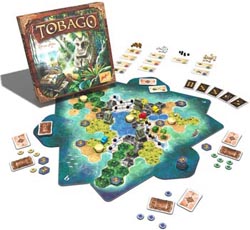
The best Good Gift Games have a little of everything, but few have as much of everything as Tobago. A number of treasures lie buried beneath the sands of this Caribbean island, and the location of each is identified by three clues. The only problem is that the clues are distributed amongst the players, meaning that they first collaborate to find the booty, and then compete to unearth it first. Part deduction game, part race game, part jigsaw puzzle, and a whole lot of fun, Tobago’s exciting gameplay and beautiful components have made this one of the most celebrated games of 2009. (More info)
Snow Tails
Fragor Games, 2 to 5 players, 45 minutes, $50
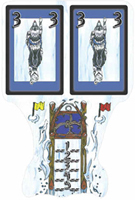
Racing games are often among the best choices for families, as even the youngest of children can intuitively grasp the goal of play. Snow Tails has the added advantage of a novel theme (dog sledding), neat mechanics, and a modular racetrack you can customize before every game. On a turn, play a number card to one of your two Huskies. If both dogs are going the same speed, the sled goes straight; but if one dog outpaces the other, the vehicle skids—and is perhaps damaged in the process. Plus, the icy trappings make it the perfect game to pull off the shelf when the snow starts a-fallin’. (More info)
Small World
Days of Wonder, 3 to 5 players, 45 to 90 minutes, $50
Risk (Revised Edition)
Hasbro, 3 to 5 players, 90 minutes, $30
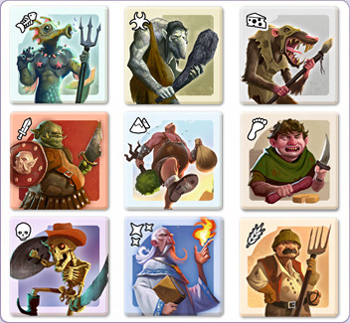
Peace on Earth and goodwill toward men is a nice enough sentiment I guess, but sometimes you just want to conquer territory. One new release and one re-release allow you do so in style. In Small World, a series of mythical tribes march across a fantasy landscape, snapping up provinces and giving the previous inhabitants the heave-ho. A unique combination system ensures the types of troops vary from game to game, with everything from Commando Halflings to Diplomat Skeletons possible. Or, if you prefer the classics, Hasbro has updated the archetypal “game of world domination” and given us an updated version of Risk. Playing time has been greatly reduced by the introduction of objectives, and players now have strategic options beyond “stonewall in Australia.” Both games are perfect for those who want a little more missile in their mistletoe. (More info: Small World | Risk)
Dixit
Libellud, 3 to 6 players, 30 minutes, $35
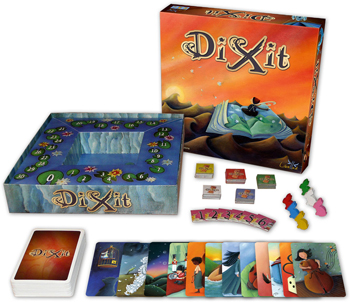
The most beautiful game on this list is also the most unusual. In Dixit, each player holds a hand of gorgeously illustrated cards, depicting scenes from the mundane to the surreal. The Storyteller selects a card from their hand, places it facedown, and then describes it to the others with a single sentence; the other players then add cards from their own hands to the facedown pool. After cards are revealed, everyone votes on which they believe was the Storyteller’s original selection. The crux of the game is a clever scoring rule in which the Storyteller is only rewarded if at least one vote went to his card and one went to someone else’s. The challenge for the Storyteller, therefore, is to craft a description cryptic enough to fool someone, but not everyone. Dixit is one of those games that sounds like it shouldn’t work, but is hilarious and engrossing in practice. (More info)
Fits
Ravensburger USA, 1 to 4 players, 30 to 45 minutes, $33
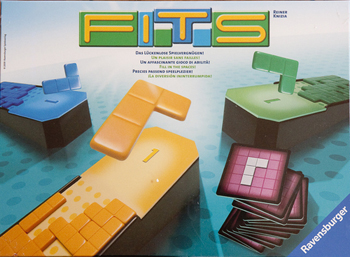
Electronic-to-physical game translations are always a bit dicey (that Big Rigs: Over the Road Racing collectable card game was certainly a debacle), which is perhaps why this is not billed as Tetris: The Board Game—even though it’s pretty much impossible to describe Fits any other way. Each turn the players are instructed to place a Tetris-esque piece onto their tilted game board, where it slides down to join those placed previous. As with its video-game counterpart, Fits rewards those who complete horizontal lines, and punishes the careless with exasperating pockets of empty space. With rules that can be explained in 30 seconds or less, you’ll just be some catchy Russian music shy of the classic ’80s arcade experience. (More info)
Cities
Emma Games, 1 to 4 players, 15 to 30 minutes, $40
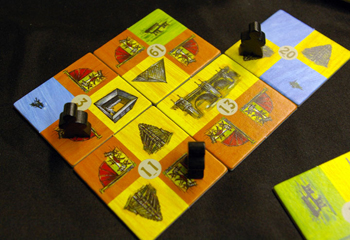
Two mainstays of the canonical Good Gift Games list are Carcassonne—in which players place tiles to build the southern French village—and Take It Easy—a light but addictive game reminiscent of Bingo. Cities takes a little from Column A and a little from Column B; the resulting game is as delightful as either. Each person has an identical set of 24 tiles, showing parks, lakes, and other attractions. Each turn a player randomly selects one of his remaining tiles and adds it to his city; the other players do likewise, each using the same tile. When the cities are complete, the player who has attracted the most tourists wins. And, because everyone played the same tiles in the same order, you can’t blame your morale-shattering loss on anyone but yourself. Won’t that be a treat? (More info)
The Adventurers
Alderac Entertainment Group, 2 to 6 players, 45 to 60 minutes, $50
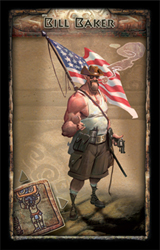
Did you see that latest Indiana Jones movie? If not, here’s a fun fact: For roughly the same price as taking the family to the theater, you can recreate the fun of the excitement of the series in your own home, without the risk of George Lucas screwing it up. In The Adventurers, players navigate a trap-filled temple, seeking to extract as much treasure as possible. What the game lacks in strategy it makes up for with copious amounts of tension—there’s nothing like the threat of death by rolling boulder to keep your mind focused on the task at hand. Kids will enjoy the gimmicky board; adults will enjoy pushing their luck as far as they possibly can. (Note: If your nephew is too young to remember Raiders of the Lost Ark, tell him the game is like National Treasure—and then cry.) (More info)
Roll Through the Ages: The Bronze Age
FRED Distribution, 1 to 4 players, 30 to 45 minutes, $30
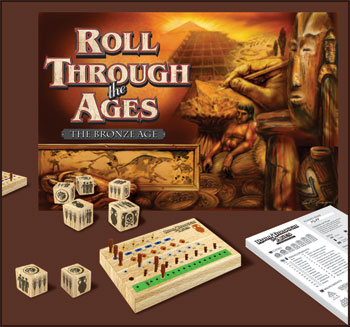
Remember that game you played at home with your parents, where you rolled five dice and tried to get scoring combinations? And remember that game you played at college by yourself, where you hunched over a keyboard for 70 straight hours trying to turn a few settlements into a flourishing civilization? Amazingly, Roll Through the Ages: The Bronze Age captures the spirit of both, and combines them into a game that’s a hundred times more interesting than the former and a hundredth as complex as the latter. Throw the bones, collect resources (food, money, workers, and commodities), and expand your empire by building cities, monuments, and developments—all this in a game that plays in 30 minutes and requires but four pages of rules. Plus, when you’re ready to take your community to the next level, you can down load the free expansion from the publisher’s website. (More info)
Maori
Rio Grande Games, 2 to 5 players, 30 to 45 minutes, $35
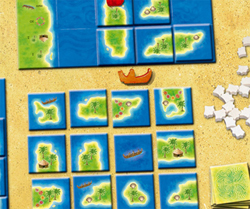
The shelves of your local board-game store contain more place names than a Rand McNally atlas: Puerto Rico, Cuba, Thebes, and the aforementioned Tobago. Now all you need are some people, and Rio Grande Games provides. In Maori you not only sail the Polynesia islands, but assemble them as well, and then go on to collect shells, find leis, plant palms, and build huts. Suitable for children as young as eight, Maori is one of the simplest games on this list, but the elegance in the design still gives the players plenty to ponder. (More info)
Pandemic: On the Brink
Z-Man Games, 2 to 5 players, 30 to 45 minutes, $30
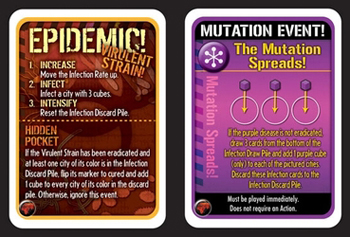
I don’t typically feature expansions on these G3s, but since I know you took my advice of last year and bought Pandemic, I thought you’d like to know that Z-Man Games has since released Pandemic: On the Brink. As in the original, players work cooperatively to cure the outbreak of deadly diseases; OtB, however, offers a variety of new options, including a new and unpredictable contagion, the ability for one person to play against the others as a bio-terrorist, and rules that allow five people to play at once. Less is generally more when it comes to infectious diseases, but the trend is thoroughly bucked here. (Note: The original Pandemic is required to play On the Brink.) (More info)
There’s a local specialty game store within spittin’ distance of your house, I’ll betcha a buck. So plug your ZIP Code into Google Maps, search for “games,” and see what you get.
Or there’s always the online option. Check out Funagain Games, Boulder Games, Boards & Bits, Gamefest, and Amazon, to name a few.
Have fun, and happy holidays!

